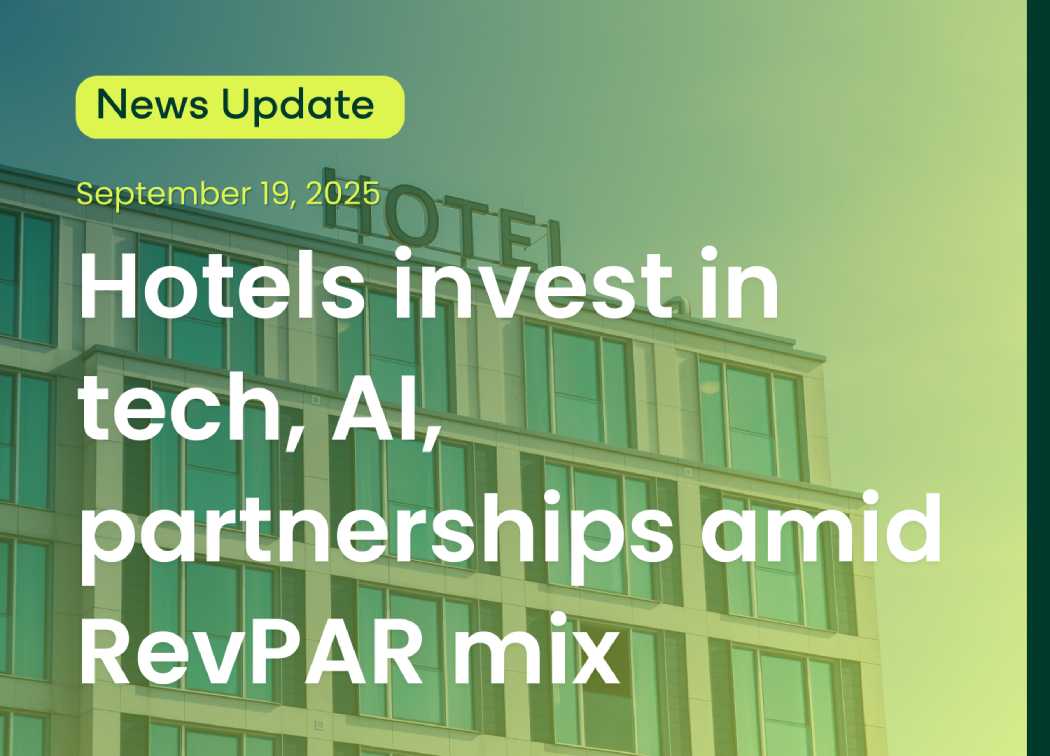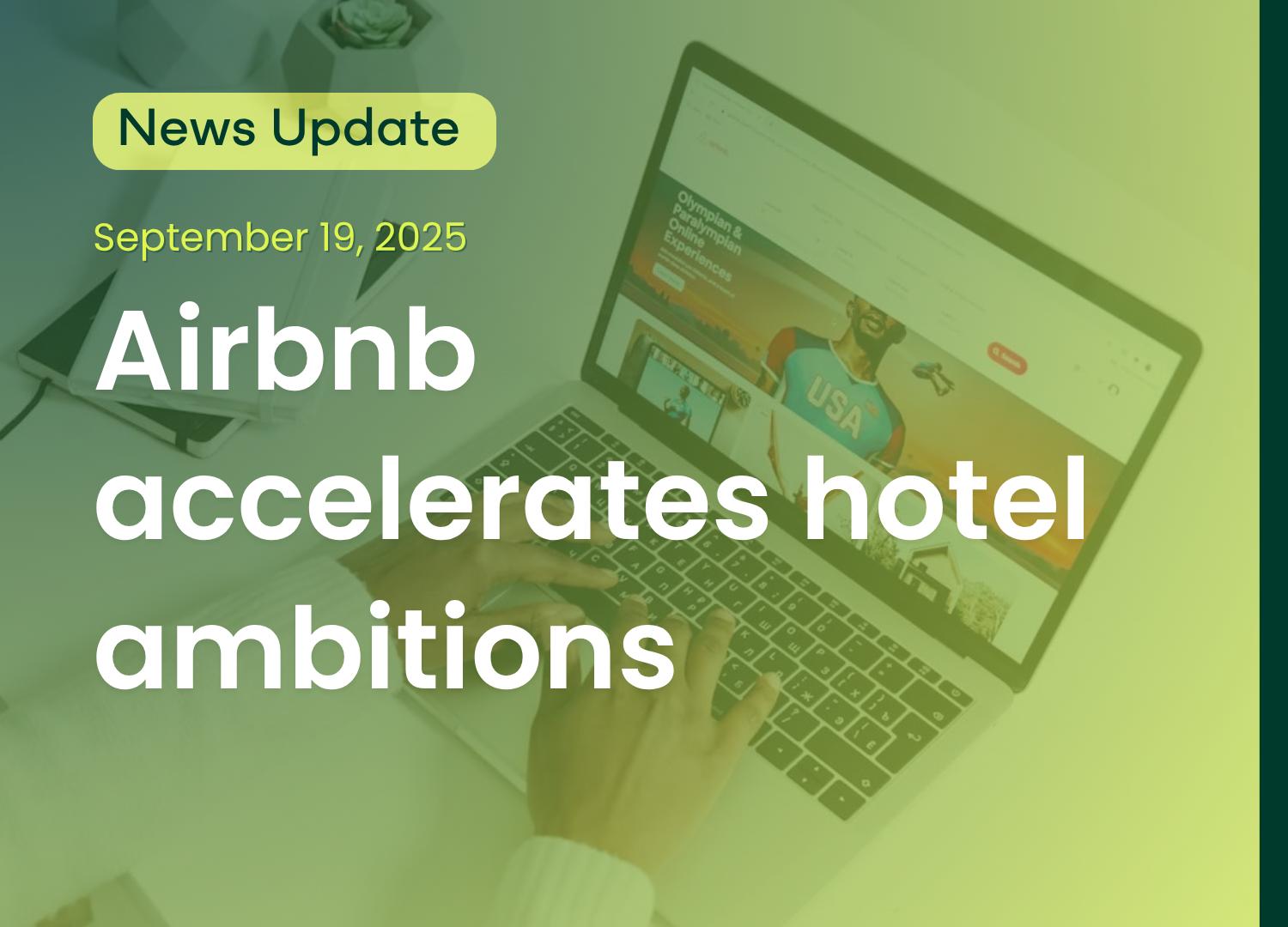Hotels invest in tech, AI, partnerships amid RevPAR mix

Airbnb to launch hotel interface, expanding travel offerings
Airbnb is set to launch a hotel interface within its app, aiming to expand its offerings to include boutique and independent hotels. This strategic move comes after Airbnb's acquisition of HotelTonight in early 2019, which was designed to bolster its travel platform capabilities by incorporating last-minute hotel bookings.
The new interface will appear as a separate tab, possibly labeled "Stays," featuring a carousel-style display to enhance user experience in browsing accommodations. Initial rollout will occur through pilot programs in cities such as New York, setting the stage for potential widespread adoption. This initiative aligns with Airbnb's recent changes to its fee structure, aiming to compete more directly with online travel agencies like Expedia and Booking.com, further diversifying its revenue stream.
System integration crucial for unlocking billions in hotel revenue
A recent survey highlights the potential financial benefits of better system integration in the hotel sector, revealing that faster, fully integrated systems could unlock at least 6% more annual revenue according to 65% of respondents. The survey, conducted in August by SiteMinder, included 700 hoteliers from diverse markets worldwide, underscoring the global scale of this opportunity which could amount to billions.
Despite the recognized importance of integration, many hotels still rely on manual processes, with 36% updating pricing on a monthly basis or less, and 79% spending over 11 hours weekly on tasks suitable for automation. The survey further identified distribution channels, resource limitations, and system silos as significant barriers to capturing more demand, although a small 17% of respondents claim to already capture all available demand. Leah Rankin, SiteMinder's chief product officer, emphasized the necessity of seamless connectivity and immediate action based on insights for future revenue optimization.
Artificial intelligence (AI) also plays a pivotal role in this landscape, with nearly half of the hoteliers seeking AI solutions, reflecting an industry shift towards leveraging AI for revenue gains. At SiteMinder’s Sync event in Sydney, these findings are being showcased alongside the introduction of the company’s AI engine, SiteMinder iQ, which marks a significant development in harnessing AI for enhanced hotel operations and revenue strategies.
Travel industry endorses EU's new code of conduct for online reviews
Major players in the travel industry, including Tripadvisor, Expedia Group, and Booking.com, along with EU Travel Tech, have endorsed the EU's Code of Conduct for Online Ratings and Reviews for Tourism Accommodation. This new code aims to enhance transparency and reliability in online reviews for consumers and businesses. Developed in collaboration with travel stakeholders and the European Commission, it underscores the critical involvement of accommodation providers and digital platforms.
Prominent figures in the industry, like Emmanuel Mounier of EU Travel Tech, emphasize that the collaboratively drafted code will improve the credibility of review systems. This initiative coincides with Tripadvisor's ongoing efforts to eliminate fraudulent reviews, having removed millions over recent years. Representatives from industry giants such as Booking.com highlighted their long-standing commitment to practices now formalized within the EU's code, underscoring the importance of authentic reviews in building consumer trust and fostering transparency.
U.S. hotel industry faces continued RevPAR declines, while global markets show mixed results
The U.S. hotel industry's revenue per available room (RevPAR) declined by 0.7% for the week ending September 6, 2025, marking the 19th weekly drop this year and the 12th in the past 16 weeks. This downturn is attributed to falling occupancy rates, with a slight 0.2% decrease in average daily rate (ADR) further compounding the issue. Major markets like Houston and Las Vegas were notably affected due to external influences such as weather-related demand shifts from the previous year and a reduction in international travel.
While Labor Day provided a modest lift in weekday RevPAR in cities like San Francisco and San Diego, the period still faced challenges, with significant declines on shoulder days and weekends. Despite Labor Day's temporary boost, the return of college football injected some weekend growth in cities such as Oklahoma City, highlighting a divergent performance across different markets. Luxury hotels managed modest RevPAR gains during weekdays, though the economy class felt the sting of the industry's broader downturn, especially in key markets.
On the global stage, RevPAR outside the U.S. increased by 3.7%, with Italy, France, Japan, and India leading the growth, counterbalancing declines in China and Indonesia. While Canadian and Mexican markets continued to grow, their pace was slower compared to previous weeks. Looking forward, the industry anticipates positive RevPAR trends in upcoming weeks due to the absence of major holidays, although the influence of events like Rosh Hashana and potential weather disturbances may introduce variables.
Triptease partners with Hospitality Solutions to enhance direct hotel bookings
Triptease, creators of a pioneering full-funnel hotel marketing platform, has announced a strategic partnership with Hospitality Solutions powered by SynXis, aiming to empower hotels to grow their direct booking channel. This collaboration integrates Hospitality Solutions' robust distribution capabilities with Triptease's web personalization toolkit for a seamless, data-driven solution benefitting hoteliers.
The partnership builds upon a longstanding relationship and leverages Triptease’s successful price comparison technology, enhancing hotels’ ability to maintain price competitiveness and build trust with guests at the point of booking. By Q4 2025, thousands of Hospitality Solutions clients will have access to Triptease’s Price Check Lite and Price Match features, offering real-time price comparisons and automatic OTA rate matching. These offerings aim to reduce booking abandonment and boost conversions.
The strategic alignment reflects a commitment to innovation and collaboration in hospitality tech, aiming to redefine guest relationship management and increase direct bookings. Charlie Osmond of Triptease highlights the shared vision of both companies in revolutionizing the industry through innovative solutions.
Hoteliers face data challenges and fragmented systems
The hotel sector continues to be plagued by data accessibility challenges and fragmented systems, with almost half of hoteliers struggling to access needed data for crucial operational decisions. A survey of industry professionals revealed that 40% cite disconnected systems as a primary obstacle, while issues such as inaccurate and duplicate data further exacerbate the problem. This instability impedes the delivery of personalized guest experiences, which are increasingly expected by today's clientele.
Fragmentation across various hotel systems also hampers operational efficiency and guest experience personalization. Many industry leaders acknowledge the detrimental impacts of legacy tech stacks, which often function in silos and do not seamlessly integrate data essential for decision-making. Furthermore, nearly half of those surveyed pinpointed CRM and loyalty systems as key areas needing improvement to foster meaningful guest interactions.
Industry experts are optimistic about AI’s potential to revolutionize data processes in hospitality. AI could provide a strategic advantage if utilized wisely, enabling hotels to optimize operations and decision-making. By efficiently learning and aggregating data, AI could liberate human staff to focus on enriching high-touch aspects of service, thus enhancing guest satisfaction and loyalty.




.svg)
.svg)


.jpg)


%201.avif)

